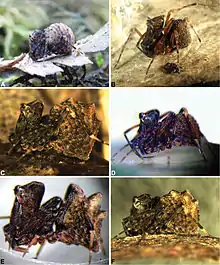Zephyrarchaea
Zephyrarchaea is a genus of Australian assassin spiders first described by Michael Gordon Rix & Mark Harvey in 2012 for nine new species and two that were formerly placed in the genus Austrarchaea.[2] The name is based on the Latin zephyrus, meaning "west wind", referring to the western distribution in Australia and a preference for windy, coastal habitats by some species. It has been encountered in Western Australia, Victoria and South Australia.[1]
| Zephyrarchaea | |
|---|---|
 | |
| Scientific classification | |
| Domain: | Eukaryota |
| Kingdom: | Animalia |
| Phylum: | Arthropoda |
| Subphylum: | Chelicerata |
| Class: | Arachnida |
| Order: | Araneae |
| Infraorder: | Araneomorphae |
| Family: | Archaeidae |
| Genus: | Zephyrarchaea Rix & Harvey, 2012[1] |
| Type species | |
| Austrarchaea mainae (Platnick, 1991) | |
| Species | |
|
11; see text | |
Differentiation from Austrarchaea
They are distinguished from Austrarchaea by a notably shorter carapace, the distribution of long hairs (setae) on the male chelicerae, and by the shape of the conductor of the male palpal bulb. The Australian Alps may be a barrier dividing the two genera.[2]
Species
As of April 2019 the genus contains eleven species:[1]
- Zephyrarchaea austini Rix & Harvey, 2012 – Kangaroo Island, South Australia
- Zephyrarchaea barrettae Rix & Harvey, 2012 – Western Australia
- Zephyrarchaea grayi Rix & Harvey, 2012 – Victoria
- Zephyrarchaea janineae Rix & Harvey, 2012 – Western Australia
- Zephyrarchaea mainae (Platnick, 1991) – Western Australia; type
- Zephyrarchaea marae Rix & Harvey, 2012 – Victoria
- Zephyrarchaea marki Rix & Harvey, 2012 – Western Australia
- Zephyrarchaea melindae Rix & Harvey, 2012 – Western Australia
- Zephyrarchaea porchi Rix & Harvey, 2012 – Victoria
- Zephyrarchaea robinsi (Harvey, 2002) – Western Australia
- Zephyrarchaea vichickmani Rix & Harvey, 2012 – Victoria
References
- "Gen. Zephyrarchaea Rix & Harvey, 2012". World Spider Catalog Version 20.0. Natural History Museum Bern. 2019. doi:10.24436/2. Retrieved 2019-05-16.
- Rix, M. G.; Harvey, M. S. (2012). "Australian assassins, part II: A review of the new assassin spider genus Zephyrarchaea (Araneae, Archaeidae) from southern Australia". ZooKeys (191): 1–62. doi:10.3897/zookeys.191.3070. PMC 3353492. PMID 22639534.